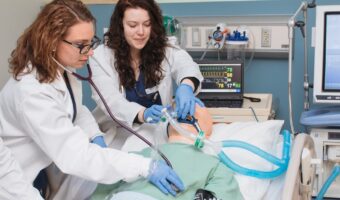Program Overview
The Physical Therapist Assistant associate degree program prepares you to become part of a physical rehabilitation team. Through classroom and clinical training, you will learn how to carry out physical therapies outlined in a PT plan of care; collect data to determine the effectiveness of patient interventions; use technology to overcome disabilities, and help people reach their goals.
Read More The Physical Therapist Assistant (PTA) associate degree program prepares students to help various people in diverse settings. After completing programs like ours, PTAs help people of all ages with various movement disorders become independent in their day-to-day functions. Physical therapy is a hands-on career, which involves working to change people’s lives for the better. Every client has a unique set of circumstances, and PTAs create a unique treatment plan for each one, under the direction and supervision of a physical therapist. Physical Therapist Assistants (PTAs) graduates can work in traditional medical environments or settings where people need to learn new ways to prevent injury or promote health, wellness, and fitness. In the field, a licensed physical therapist (PT) supervises the PTA. The PTA works with individual clients or groups under the direction of a PT. Upon graduating from physical therapy assistant (PTA) programs, they can work in rehabilitation hospitals, nursing homes, hospitals, and other places that offer aide programs or require an exercise physiology specialist. In the associate degree program, students learn to act as part of the rehabilitation team, collecting data to determine patient interventions’ effectiveness and carrying out selected physical therapy interventions outlined in the PT treatment plans and programs. In physical therapy assistant programs, the students learn how to use technology to help people overcome disabilities and design activities to help people reach their goals. After completing classroom training on campus and Level I Clinical Education off-campus in our PTA programs, students enter the community for Level II Clinical Education. The two Level II Clinical Education experiences give students many opportunities to apply classroom training to real-life situations. Upon successful completion of all degree requirements in our PTA program, students will be eligible to sit for the National Physical Therapy Examination for Physical Therapist Assistants. This is an important licensure exam. After passing this physical therapist assistant examination, employment opportunities are available in various settings in physical disabilities, pediatrics, geriatrics, and athletic facilities and wellness programs. After completing certain prerequisites*, graduates of Physical Therapy Assistant (PTA) programs like ours are eligible to continue for a Bachelor of Science degree in Rehabilitation Sciences or Business Management with a Healthcare Management/Respiratory Care (MGTH) concentration. You can find more enrollment information on our website on APTA admission requirements. Learn more about the physical therapist assistant examination.Full Description
Potential Career Opportunities
Physical Therapist Assistant
Rehab Technology Professional
Assistive Technology Professional
FAQ
-
Can you be a physical therapist assistant with an associate degree?
According to the Bureau of Labor Statistics, an associate degree is sufficient for PTAs to begin work.
-
What education do you need to become a physical therapist assistant?
You’ll require a two-year associate degree to start work as a physical therapy assistant.
-
Will PTAs phase out?
According to the Bureau of Labor Statistics (BLS), employment among physical therapy assistants should grow by 29% between 2019 and 2029, a much faster rate than projected for other careers.



